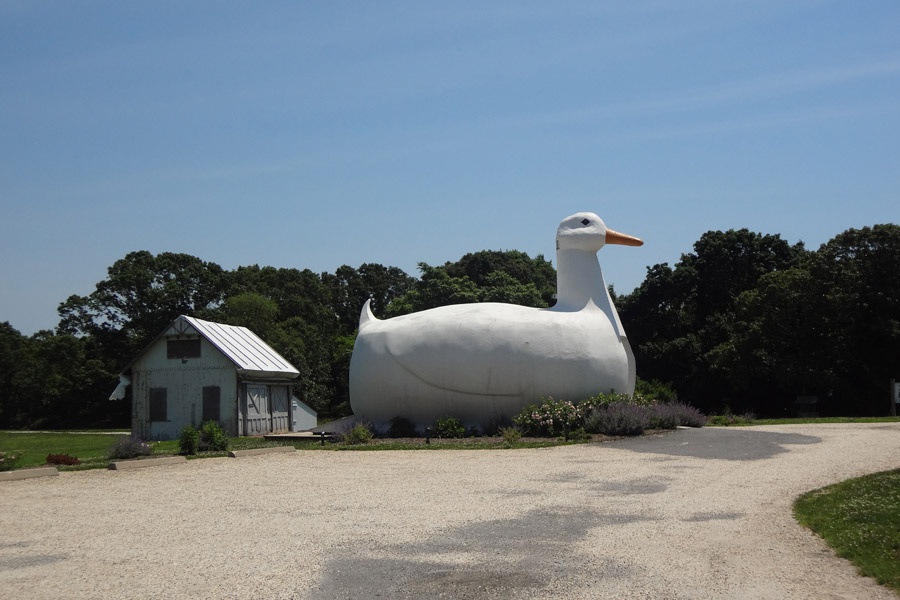The Big Duck in Flanders to Add Museum

Just about anyone who’s been through Flanders knows about the Big Duck—a 20-foot-tall Peking duck is hard to miss. But many people don’t know about the lost Long Island industry that the Big Duck represents: duck ranching. With the help of a grant from Suffolk County, that may soon change.
“We’re really planning something kind of simple here,” said Southampton Town Historian Zach Studenroth, who is spearheading the proposal. He plans to use the money to convert the old barn behind the Big Duck into a small museum cataloguing the history of duck ranching on Long Island. “It’s mostly a summer thing, so we’re not picturing heat or water,” he said. “It’s just about running electricity out there for the exhibits we create.”
The grant would come from the Suffolk County Office of Film and Cultural Affairs. “They have a competitive grant program, somewhere in the range of $5,000 to $10,000, so this is not a big ticket item,” Studenroth said. “But with that kind of money, we could generate a pretty nice exhibit.”
The Friends of the Big Duck, a not-for-profit organization dedicated to preserving the Big Duck’s history, is already collecting pieces for the exhibit. “The Friends are very excited about this project moving forward,” said Fran Cobb, president of the Friends of the Big Duck. “We have quite a large collection of artifacts which will be in the museum, and hopefully it will be done by the end of the summer.”
The Big Duck itself, which is owned by Suffolk County, was originally built by a Riverhead duck farmer in 1930 as a stand from which to sell his goods. It has been on the National Register of Historic Places since 1997, primarily because of its impact on commercial architecture. “We had it put on the National Register when it was located at Sears Bellows County Park down the road,” said Richard Martin, Director of Historic Services for the Suffolk County Parks Department. “They were willing to put it on, even though it wasn’t at its original location, because it was considered roadside architecture, and the building is more important than the site.”
The Big Duck Ranch, which is owned by the Town of Southampton, was added to the National Register of Historic Places in 2008. Converting the old outbuildings on the farm would ensure that there would be money to repair and maintain them in the future. “The fact that three of the accessory buildings were left standing is what enabled the town to meet that responsibility of getting the property listed on the National Register,” Studenroth said. “My feeling was that as long as it stands there without any use, it’s not going to get repaired, and it’s not going to be regarded as something worth investing money in.”
Most recently, the small stucco building by the road was renovated and converted into a restroom for visitors. Now, Studenroth would like to focus on the brooder barn behind the Big Duck, which has fallen into disrepair. “Ultimately, any old wooden building left to its own devices is not going to stand forever,” he said. “If we could build an exhibit that would talk about duck farming originating in Southampton, spreading to adjoining towns and becoming the Long Island industry that it did, that alone would justify an expenditure of money to stabilize and restore that building.”
Martin has been involved with the Big Duck since it was donated to the county in 1987, and he would like to see it represent more than just a quirky building style. “It’s a good idea to give a sense of all of the duck business on Long Island. We have a few bits and pieces here, but not a comprehensive view of it all,” he said.
Duck ranching was one of the biggest industries on Long Island until the 1960s. “In the late ’50s, there were about 90 duck farms, spread out along the waterways,” Martin said.
As the county transitioned to a more suburban landscape, the land became more valuable for homes than farms.
“The farmland’s always getting sold off for development—it’s the classic Long Island story,” Martin said. Preserving the Big Duck Ranch would help people see that story. “It’s really an historic artifact of an activity and a life of farming on Long Island that essentially doesn’t exist anymore.”
For more information, visit bigduck.org.



